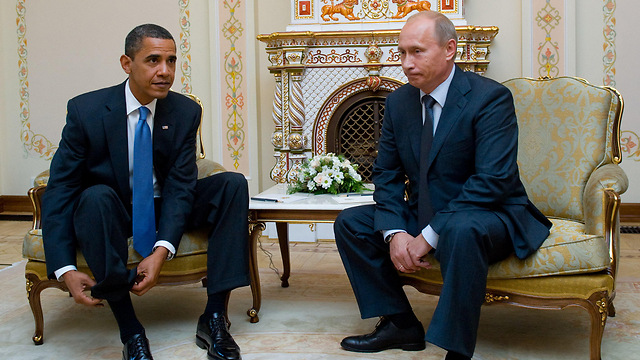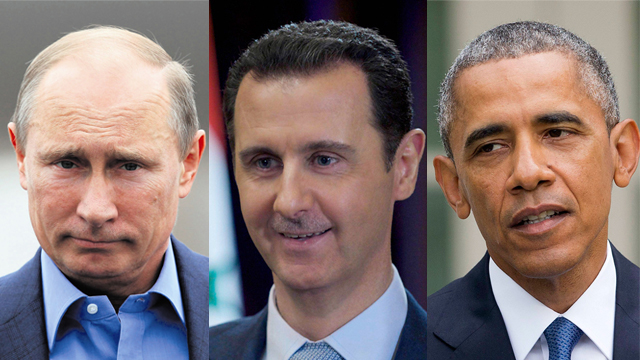Faced with a truce in Syria that never truly took hold, the US suspends talks with Russia regarding the deal; Russia also decides to air out its grievances against the US, suspending their plutonium disarmament treaty over disputes regarding Syria and Ukraine.
The US State Department said on Monday that the US is suspending bilateral contacts with Russia over Syria. Russia, for its part, also came out with a statement on Monday, saying that it is suspending a plutonium disarmament deal wth the US.
The US announcement came after last week’s threat by Secretary of State John Kerry to suspend contacts amid new attacks on the city of Aleppo. The department said in its statement that Russia had not lived up to the terms of an agreement last month to restore the cease-fire and ensure sustained deliveries of humanitarian aid to besieged cities.

As part of the suspension, the US will be withdrawing personnel that it had dispatched to take part in the creation of a joint US-Russia center. That center was to have coordinated military cooperation and intelligence if the cease-fire had taken hold. The suspension will not affect communications between the two countries aimed at de-conflicting counter-terrorism operations in Syria.
An end to the Russia-US plutonium treaty
The US State Department’s announcement came as Russian President Vladimir Putin suspended a treaty, as well, regarding the Kremlin’s agreement with Washington to clean up weapons-grade plutonium, thus signaling that he is willing to use nuclear disarmament as a new bargaining chip in disputes with the United States over Ukraine and Syria.
Starting in the last years of the Cold War, Russia and the United States signed a series of accords to reduce the size of their nuclear arsenals, agreements that have so far survived intact despite a souring of US-Russian relations under Putin.
But on Monday, Putin issued a decree suspending an agreement, concluded in 2000, which bound the two sides to dispose of surplus plutonium originally intended for use in nuclear weapons.
The Kremlin said it was taking that action in response to unfriendly acts by Washington.
The plutonium accord is not the cornerstone of post Cold War US-Russia disarmament, and the practical implications from the suspension will be limited. But the suspension, and the linkage to disagreements on other issues, carries powerful symbolism.
“Putin’s decree could signal that other nuclear disarmament cooperation deals between the United States and Russia are at risk of being undermined,” Stratfor, a US-based consultancy, said in a commentary.
“The decision is likely an attempt to convey to Washington the price of cutting off dialogue on Syria and other issues.”

US Secretary of State John Kerry last week warned that Washington could halt diplomacy with Russia over the conflict in Syria unless Russia took immediate steps to stop the violence there.
Western diplomats say an end to the Syria talks would leave Moscow without a way to disentangle itself from its military operation in Syria. The operation was intended to last a few months but has now just entered its second year.
A list of grievances
As well as issuing the decree ordering the suspension of the plutonium cleanup deal, Putin submitted a draft law on the suspension to parliament.
That draft linked the suspension to a laundry list of Russian grievances toward the United States.
It said conditions for resuming work under the plutonium deal included Washington lifting sanctions imposed on Russia over its role in the Ukraine conflict, paying compensation to Moscow for the sanctions and reducing the US military presence in eastern Europe to the levels they were 16 years ago.
Any of those steps would involve a complete U-turn in long-standing US policy.
“The Obama administration has done everything in its power to destroy the atmosphere of trust which could have encouraged cooperation,” the Russian foreign ministry said in a statement on the treaty’s suspension.
“The step Russia has been forced to take is not intended to worsen relations with the United States. We want Washington to understand that you cannot, with one hand, introduce sanctions against us where it can be done fairly painlessly for the Americans, and with the other hand continue selective cooperation in areas where it suits them.”
The 2010 agreement, signed by Russian Foreign Minister Sergei Lavrov and then-US Secretary of State Hillary Clinton, called on each side to dispose of 34 tonnes of plutonium by burning it in nuclear reactors.
Clinton said at the time that there was enough of the material to make almost 17,000 nuclear weapons. Both sides back then viewed the deal as a sign of increased cooperation between the two former Cold War adversaries.
Russian officials alleged on Monday that Washington had failed to honor its side of the agreement. The Kremlin decree stated that, despite the suspension, Russia’s surplus weapons-grade plutonium would not be put to military use.
As reported by Ynetnews
